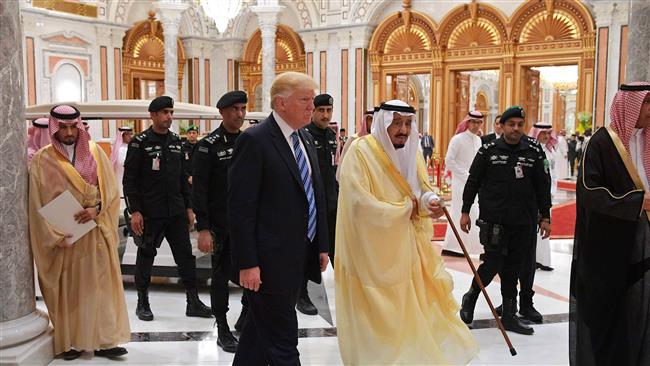
RNA - Instead, he announced the $110 billion deal will take effect immediately, extend up to $350 billion over 10 years, Saudi Arabia is US arms dealers’ most important client and is Washington’s No. 1 ally in the Middle East region, particularly in the forgotten military aggression against Yemen, which has claimed the lives of more than 14,100 people, most of them civilians.
In his view, Saudi vassals have every right to incessantly pound Yemen and bring back to power the resigned president, Abd Rabbuh Mansur Hadi, who is a staunch ally of Riyadh. Riyadh cannot and should never be allowed to fail to reach its criminal goals despite suffering great expense; and the Saudi regime is free to sponsor Takfiri terrorists fighting against Syria, which has left thousands of people dead and millions more displaced.
In the president’s view, the White House has every right to affect regime change in Damascus; dismiss the de-escalation zones agreement reached between Iran, Russia and Turkey; and strike as many civilians as possible on the territory of another sovereign state without its consent or any UN authorization. There is room for very minor shifts in this excessive policy that make sure war-party Washington does not harm the most vulnerable allies. Especially for terror proxy forces in need, the Trump White House does not want to leave the “moderate” goons without weapons and munitions. Looking at that, the regime changers always want to keep that in mind.
In the interim, no one at the United Nations presses the Trumpsters on their views about the colonial policy’s underlying philosophy: Is Yemen entitled to peace? Is every Syrian entitled to peace, and could the de-escalation zones agreement be something that ought to be that ultimate guarantor?
Trump wants to make sure the deal will never hold, just as the way he is making sure Saudi-led, US-backed war on Yemen will carry on and will never harm the most vulnerable terror proxies in there or in Syria. His massive arms deal with Saudis is merely a set of long-term policies that reflect his war priorities. He embarked on a racialized course of scapegoating and refused to rule out more sanctions against Iran and Russia as part of that process. He wants to have an all-out confrontation, but just in words and without engaging the US in action. It’s good for business.
Though Trump is unable to help regional allies to regime change Syria and Yemen, he did succeed in destabilizing the region for many years to come. His deplorable Saudi arms deal has effectively cast a shadow of war over the millions of people living in the Middle East and North Africa without the hope for permanent peace and tranquility. This shadow accompanies them wherever they go in their daily lives. This divisive arms deal not only serves to incite fear of war; it also helps to exacerbate regional insecurity and chaos, and most importantly, mistrust among Muslims, even among Saudi Arabia’s own allies.
Trump’s discursive policy of weaponizing allies has inspired sectarian warfare as well because his administration hasn’t hesitated to carry out its threats against Iran and its close allies. In its first months, the Trump administration imposed travel ban on Muslims, particularly Syrian refugees, that despite the judges’ overturn is still ongoing. Half the Muslim people applying for visa never get to travel to the United States. And the results have been predictable, as an eroding trust in so-called “American democracy” and “American dream” across the country. It’s not surprising that Islamophobe Trump’s Islamopbobia campaign has undermined Muslim trust and instigated resentment, as many pundits have attested.
Trump’s own role in furthering regional and global insecurity must also be accounted for. When candidate Trump vaunted his success in helping end the endless war on the Muslim world, it was not surprising to learn that the United States and the mere extras were still going ahead with plans to destroy Iraq, Syria and Yemen. The move was unsurprising in that it was consonant with the ruse to provoke cash cow Saudi Arabia to purchase even more American arms. This flow was abetted and facilitated by the Pentagon regime and the Military-Industrial Complex seeking to maximize profit and minimize US military costs while stretching terror chains around the region.
This asymmetry has made the region highly vulnerable to exploitation as attempts to resist American hegemony and wars of aggression and deceit have often been met with threatened military attack and coup – even in the case of Qatar which wants better ties with Iran. So it is no coincidence that, over the past few days, the growing insecurity and chaos has taken place while the region has become increasingly militarized and while discussions of ending the twin wars on Syria and Yemen have been frequently linked to Iran leaving these two allies to their own devices. All of this has predated Trump.
This president and his pro-Israel cabinet plan to take the profitability of the permanent war on terror, Islam and suchlike to new heights by giving massive arms to the Israel-allied despots of the Persian Gulf and by imposing further sanctions against Iran and Russia. It’s a kind of desperate contradiction between candidate Trump’s populist promises and President Trump’s goal of “making America rich again.” Trump cannot maintain this contradiction without drowning out international condemnation in the noisy drumbeat of warmongering, scapegoating, and Islamophobia.
847/940